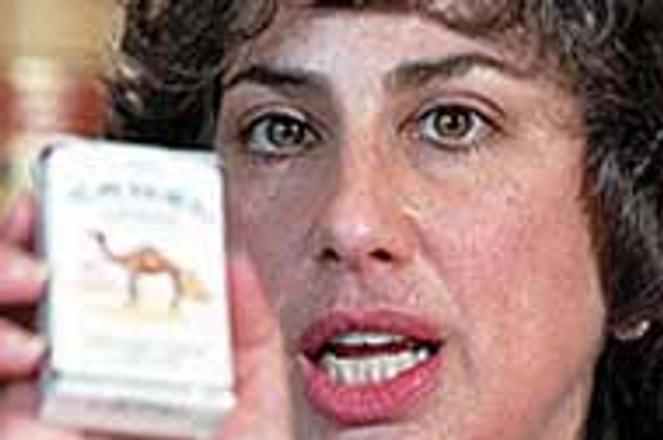Attorney Madelyn Chaber, pictured talking to reporters in San Francisco on March 27, was the first to win punitive damages for a smoking client since warning labels were put on cigarette packs in the US.
With the approach of the fourth annual Daffodil Day, an event organised on April 7 by the Slovak Anti-Cancer League to raise research funds and public awareness, leaders are calling for the country's citizenry and government to pay more attention to what they say is Slovakia's increasing cigarette problem. According to the League's President Eva Siracká, the seriousness of the smoking issue is not yet recognised by Slovak people and is being neglected by government officials.
"State officials are being negligent, they hope that the situation will somehow solve itself," Siracká said, adding that top Slovak politicians, as well as TV journalists and pop singers, are often seen smoking on television. "They don't realise they are being bad role models for our youth."
As a result of this high-level negligence, she said, Slovak society continued to downplay the damaging consequences of smoking. But statistics show that smoking amongst Slovaks is a bad habit that is killing more and more citizens every year.
According to Eva Rozborilová, head of the Treatment Clinic for Tuberculosis and Lung Diseases (TLD) in Martin, 11,000 Slovaks die from smoking-related diseases every year (see graph, page 2). Of this number, more than 7,300 are men between the ages of 35 and 69. Furthermore, she said, 45% of all Slovak men and 30% of Slovak women are today smokers.
"Men smoke more than women, but we've observed an increase in women smoking during the last 10 years," Rozborilová said. "In 1992, 'only' 25% of all Slovak women smoked. The 5% increase may be due to the emancipation process that has taken place here but also because of the social and economic pressures in our country."
Indeed, while falling real wages may be making it more difficult for Slovaks to afford the habit, cigarettes sales in Slovakia have shown no sign of falling. According to Jozef Banáš, head of public relations at Slovak International Tobacco - Slovakia's second biggest tobacco firm, holding a 44% market share - Slovaks smoked a total of 10 billion cigarettes in 1999. "The official number of cigarettes sold was 9.6 billion, but if we consider the illegal cigarette market, it's 10 billion," he said. In other words, the average Slovak - babies included - smoked 2,000 cigarettes last year for an average of 5.5 per day per citizen.
For anti-smoking leaders like Siracká, such statistics show that the country has not been properly educated to the harmful effects of smoking. It has not helped, she added, that "almost 36% of Slovak doctors smoke. This is very sad - the people who should know best about the damage that smoking causes are themselves smokers."
Banáš, for his part, repeated the smoking lobby's mantra that smoking had received an unjust, and unproven, reputation as a killer. "If an alcoholic dies of liver cirrhosis and they find out that he was a smoker, doctors automatically assume that he died because he smoked," he said. "How can they prove that?"
Starting young
Statistics issued in January by the Slovak Educational Information and Prognosis Institute show that Slovak smokers start young: 25% of teenagers smoke regularly, while 14.5% do so occasionally. As a result, Siracká said, the anti-cancer league focused on spreading awareness to the country's youth. Last year in November, for example, they started awareness courses at secondary schools around Slovakia.
"More than 30 schools decided to participate in this programme," she said. "It's very important to teach our children about the damaging effects of smoking and I believe that it's worth our effort."
Rudolf Štefanovič, the Health Ministry's Public Health Care Director, said that the ministry was trying to educate the public of the hazards of smoking by printing the dangerous side-effects on cigarette packets. The 1997 Non-Smokers Protection Law forced cigarette makers to dedicate 10% of their total package space to a warning issued by the Health Minister. Today, warnings such as "smoking seriously endangers your health," "smoking causes heart disease," and "smoking by pregnant woman may result in birth defects," are mandatory, and Štefanovič said the ministry was considering banning misleading pack inscriptions like 'super-light' and 'ultra-light'.
Price hike?
Adding to the country's smoking problem is that cigarettes in Slovakia are cheap compared to other EU countries and the US. Whereas a pack of 20 cigarettes in the US costs between four and five dollars, a pack in Slovakia costs between 32 and 60 Slovak crowns ($.75 to $1.40).
On February 29, Slovak tobacco producers met with official representatives from the Finance Ministry to discuss new taxation laws on tobacco products. In order to bring Slovak tax regulations in line with those in EU countries, Slovakia may increase the current average cigarette tax of 31.3% nearly two-fold to 57%.
Slovak International Tobacco's Banáš said he did not fear a dramatic increase in Slovak cigarette prices anytime soon. "The new taxation policy wouldn't be approved until sometime in 2001 or 2002," he said. "But the state realises that they can't charge 80 crowns per pack - Slovaks would immediately protest."


